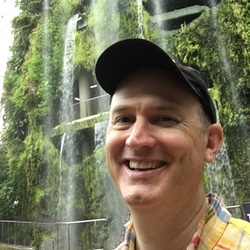Spotlight on Faculty: Eric Armstrong
1. Who are you?

My name is Eric Armstrong, and I’m an associate professor in the Department of Theatre. When people ask me what I do, I like to tell people that “I teach actors how to use their voices.” At York, I work with the actors in the BFA and MFA Acting programs, and I cover everything from breath, resonance and articulation, to speech sounds, phonetics, and accents, to Shakespeare, poetry, and other text forms. In my professional work outside of York, I work as a Dialect Designer for theatre, television and film. I have worked with theatre companies like Mirvish, SoulPepper, Crows, Buddies in Bad Times, Royal Manitoba Theatre Centre, and Canadian Stage; I have worked on television shows such as The Expanse; and on films, such as On the Basis of Sex, where I coached Felicity Jones’ performance as Ruth Bader Ginsburg, which will be released in November.
2. Tell us about a creative or research project that you have been immersed in recently.
I am currently working to finish an important project entitled “Best Practices in Accent Training for Indigenous Actors,” funded by a SSHRC Insight Development Grant, with my co-applicant and colleague, Shannon Vickers of the University of Winnipeg. There are 3 phases of the project: consultation, field work, and return. In the consultation phase, we lead 4 Focus Groups, two face-to-face, and two online, with groups of Indigenous actors, to find out what their experiences with Indigenous accent and language has been like in theatre, television and film, and their suggestions on how best to develop resources for Indigenous actors. In Phase 2, which we’re working on now, we’re doing field work to record samples from First Nations people with accents, to share with Indigenous actors who want to learn accurate accents for their work. Production/Design student Nishina Loft is helping with this process, and we’re hoping to record samples in July and August. Phase 3, The Return, will see Shannon Vickers and I sharing the materials and discoveries we’ve made about Indigenous accents with Indigenous actors in workshops, both in person and online. We also hope to provide training to accent coaches on how to teach these accents with sensitivity and respect.
3. What production or artist or scholar has had the most impact on you over the course of your career?
I can’t begin to answer this question without mentioning my mentor and colleague, David Smukler, who trained me to be a voice teacher in the MFA program here at York in 1992-94. However, I must say that the greatest on-going impact on my work, as a teacher, coach, and researcher, must be my colleagues in the Voice And Speech Trainers Association, VASTA. I have been deeply engaged with this service organization for my profession since 1995, having served on the board, and taken on many roles within the organization. I’ve also published in the VASTA Journal, The Voice and Speech Review repeatedly, and their newsletter, The VASTA Voice, countless times. I engage with colleagues from VASTA on an almost daily basis through their Listserv and Facebook pages. The organization has taught me what I can be, held up great examples of role models that I aspire to emulate, and offered up opportunities for growth, engagement, contribution, service and, frankly, friendship, for the past 23 years. They say “it takes a village,” and VASTA has been my village.
4. Is there an image or a quotation that inspires you?
“In a time of drastic change it is the learners who inherit the future. The learnèd usually find themselves equipped to live in a world that no longer exists.”
—Eric Hoffer, Reflections on the Human Condition (1973)
I strive to be a life-long learner, and to stop pretending to be learnèd. I must keep asking what do I—and my students—need tomorrow, rather than what did we need
yesterday.